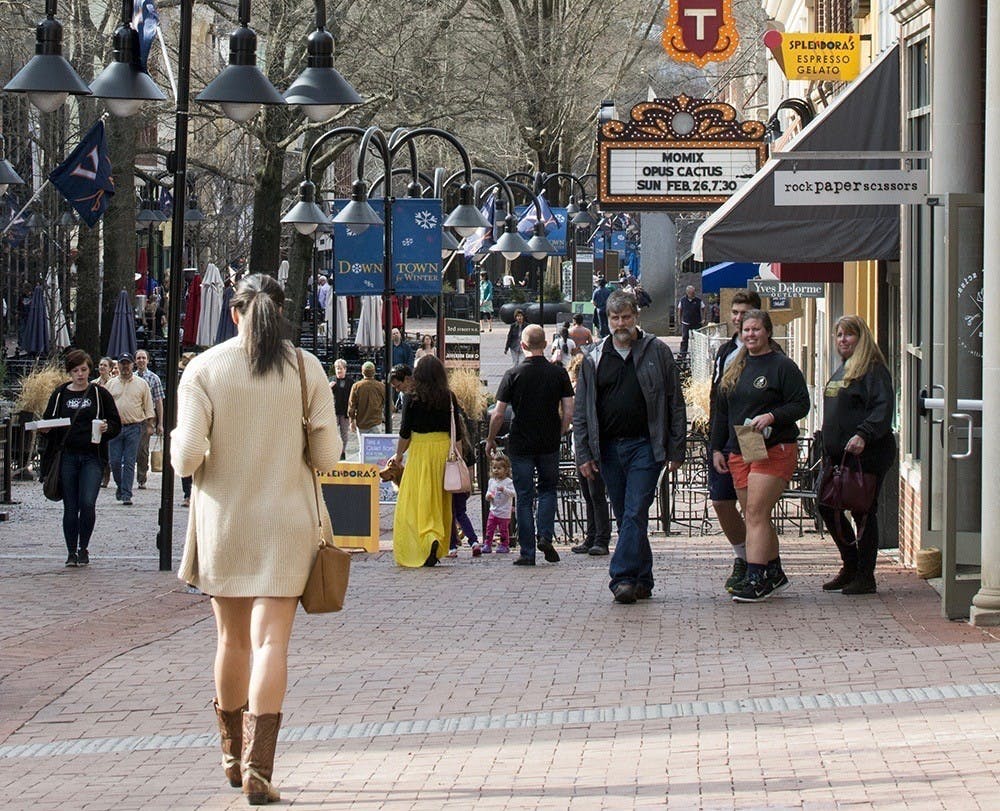Charlottesville City Council approved a $75,000 marketing grant for the Downtown Mall at its meeting Monday. It also heard presentations on the proposed budgets for the City Manager and School Board and discussed the lease of the McIntire Building, which houses the Albemarle Charlottesville Historical Society.
The discussions followed a public comment period, during which members of the community could express their thoughts and concerns.
Jason Kessler, a local white nationalist and organizer of the deadly Unite the Right rally in August, was escorted out of Council chambers by police after refusing to relinquish the microphone following his three minute speaking time. It’s unclear what Kessler initially intended to say, but he spent a moment deriding protesters in the Council chambers for chanting and then asked that the time lost to the shouts be restored.
A City resident also mentioned an incident where, during a Charlottesville Circuit Court jury trial Monday, Judge Richard Moore — the jurist who ruled last week that the tarps on the statues of Confederate generals Robert E. Lee and “Stonewall” Jackson downtown must be removed — told audience members that wearing a Black Lives Matter t-shirt could lead to a contempt of court charge. Solidarity Charlottesville and Black Lives Matter Charlottesville both posted about the incident on social media.
Mayor Nikuyah Walker said one of the women forced to cover her shirt is speaking with an attorney. Walker and Councilor Kathy Galvin both inquired about how the City can address the matter.
“I don’t think there’s something the city can do to tell the judge to act in a certain way,” City Manager Maurice Jones said.
By a 3-1 vote, Council approved a $75,000 marketing grant for the Downtown Business Association of Charlottesville, a non-profit organization which supports local business and commerce in downtown Charlottesville. The resolution was amended to include a provision wherein businesses receiving the grant must match through $30,000 in cash or in-kind support. Councilor Wes Bellamy was absent from the meeting, and Walker voted against allocating the funds.
The grant will reimburse pre-approved businesses on the Downtown Mall for marketing expenses. Some speakers during public comment said the money was an unregulated public handout to private businesses.
“I don’t necessarily have an issue with giving some money to downtown businesses, but I think it was done really irresponsibly in terms of there being no plan, no proposals, no details on how that money’s going to be spent,” Albemarle County resident Ken Horn said. “I think that the city budget is a reflection on the values, the morals and the ethics of the city, and so when you’re giving money over here, you have to kind of wonder, where are you not giving money.”
Others, including Lindsey Daniels, the general manager of Revolutionary Soup, said the plan would be a boon for the local economy.
“This is about me being able to hire people who need jobs,” Daniels said. “They walk from Garrett Square to come work with me. So I would really appreciate being able to print more flyers and have more people come in.”
The resolution notes that tax revenues have been volatile since last summer’s white nationalist Unite the Right rally and that this marketing allotment for Downtown businesses could stabilize and increase the city’s earnings. However, Walker disagreed with the idea that fear was keeping potential patrons out of the mall.
“When you’re talking about safety concerns or business dwindling because of the summer events, you have the market — that’s an outdoor space where people can’t really go anywhere for protection — and the very next Saturday they were back in full swing,” Walker said. “So it’s hard for me to wrap my head around some of the request, and saying that the events of the summer were the cause of it, when seeing just a block over people were attending just the next week.”
During the meeting, Jones presented key points in his proposed 2019 budget for the city. The total expenditures sum to $179 million, a 4.48 percent increase over the 2018 budget. The budget allocates more money for affordable housing and the school system, but some noted that throwing money at an issue doesn’t necessarily resolve it.
“[Councilor] Bellamy has had us looking at an equity lens … even with the school being the primary driver [of growth], our school system is doing really well in a lot of areas, but it’s not doing really well based on race and class,” Walker said. “I think we have a lot of work to do to make sure that the community as a whole benefits from the investments that we make, and I think that’s our greatest challenge.”
However, Walker also noted that, for Charlottesville, budgeting is as much an academic process as a fiscal one.
“It’s something that I’m learning, it’s something we have to figure out and something we have to get right,” Walker said.
There are four scheduled work sessions, two public hearings and one community forum on the budget scheduled through April.
Council will reconvene March 19.







